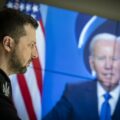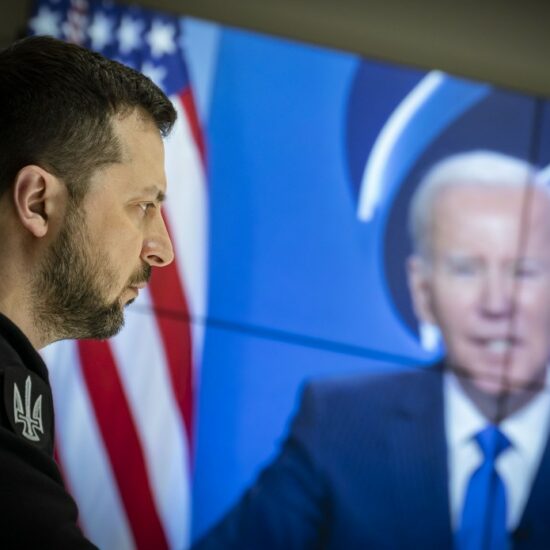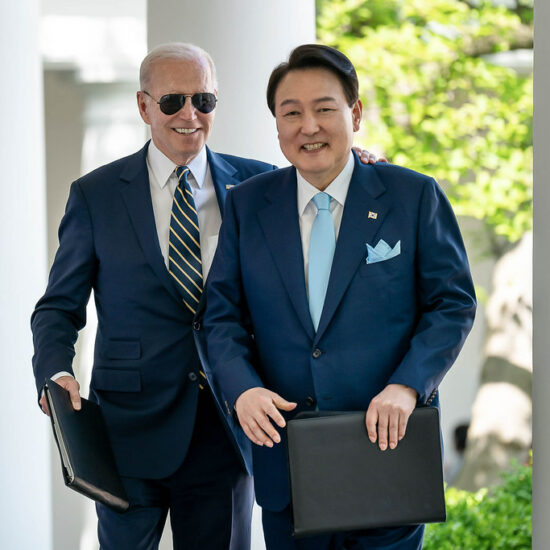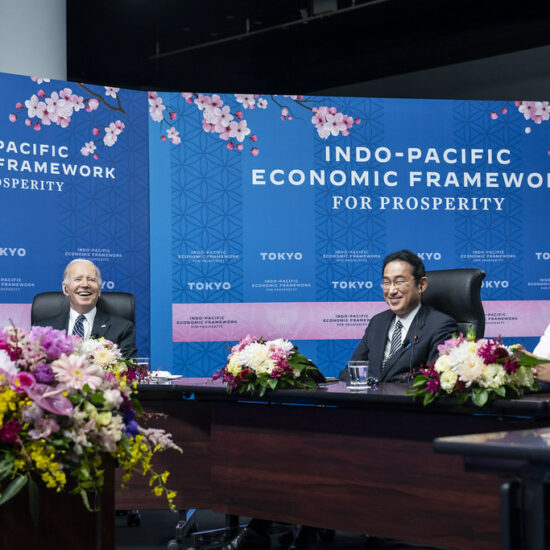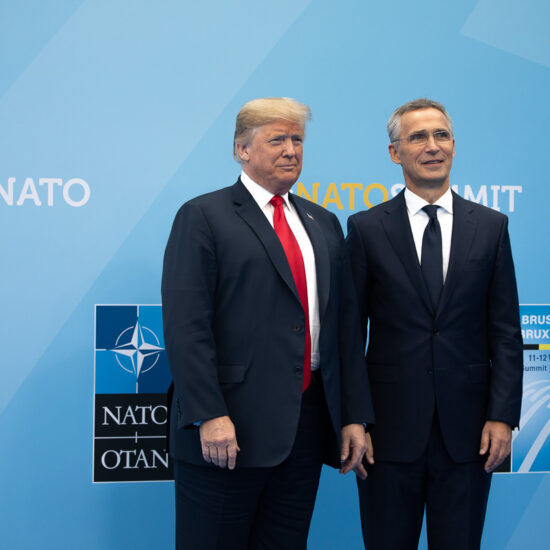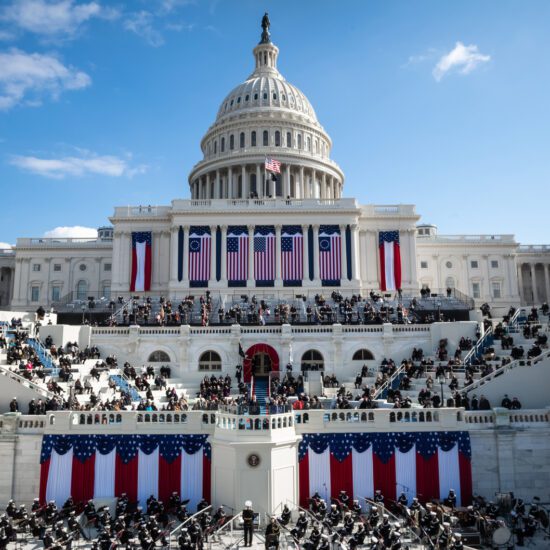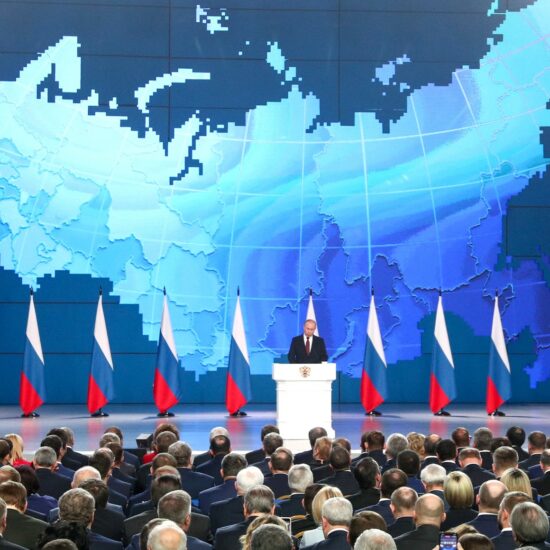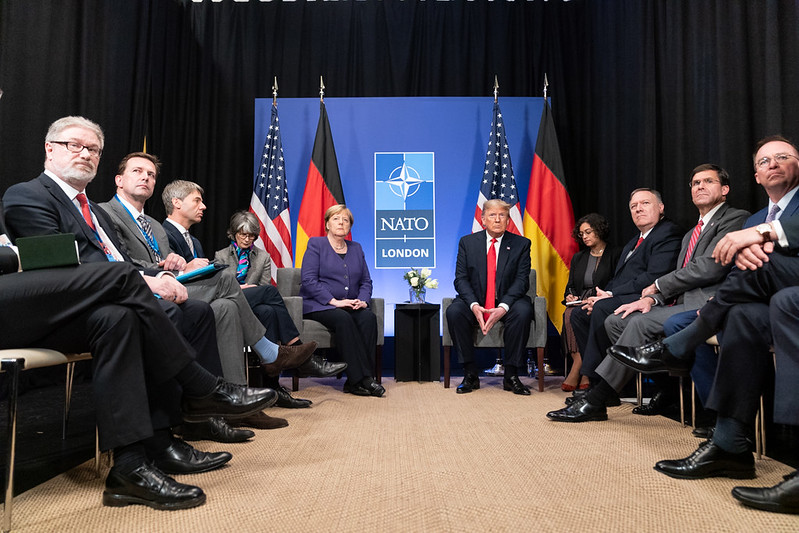
Image Credit: The White House
When it comes to foreign policy, Western policymakers today suffer from a Manichean worldview, a caustic mindset crystallized during a decades-running Cold War with the Soviet Union.
By Arta Moeini | IPD Research Director
This article was originally published on The American Conservative, under the title “Why the Blob Needs An Enemy.“
In this new piece for The American Conservative, the Institute for Peace & Diplomacy’s Research Director, Dr. Arta Moeini, argues that the persistence of the Blob – the North Atlantic foreign policy establishment – and their relentless support for primacy can be explained using a psychosociological and generational analysis. Shaped by the dualistic paradigm of the international system during the Cold War, this Baby Boomer Generation of elites suffers from a Manichean psychology and ideological fixation crystallized through the decades-running US-Soviet rivalry. This Boomer Blob continues to promote a belief in exceptionalism and indispensability, interventionism and moral activism in foreign policy, despite recent systemic shifts away from American global hegemony and toward multipolarity. In order to challenge this status quo, Dr. Moeini calls for a generational shift in foreign policy leadership toward Millennials and post-Millennials, who have become more restrained and have developed a keen appreciation for realpolitik given their unsettling experience with catastrophic global interventions and endless wars.
Despite its many failings and high human, social, and economic costs, American foreign policy since the end of the Second World War has shown a remarkable degree of continuity and inflexibility. This rather curious phenomenon is not limited to America alone. The North Atlantic foreign policy establishment from Washington D.C. to London, which some have aptly dubbed the “blob,” has doggedly championed the grand strategic framework of “primacy” and armed hegemony, often coated with more docile language such as “global leadership,” “American indispensability,” and “strengthening the Western alliance.”
In America, this unfortunate status quo in support of primacy persists even in the Trumpian Age and within debates around the eccentric and unconventional presidency of Donald Trump. In fact, despite all the talk of political polarization in the United States, it appears that when it comes to naming new threats and enemies to “contain,” “deter,” and deem “existential,” bipartisan consensus is found swiftly and quite readily. On the Left, and in the wake of President Trump’s election, the Democratic establishment began fixating its wrath on Russia–adopting a confrontational stance toward Moscow and fueling fears of a renewed Cold War. On the Right, the realigning GOP has increasingly, if at times inconsistently, singled out China as the greatest threat to U.S. national security, a hostile attitude further exacerbated in the wake of the COVID-19 pandemic. Alarmingly, Joe Biden, the Democratic presidential nominee, has recently joined the hawkish bandwagon toward China, even attempting to outflank Trump on this issue and attacking the president’s China policy as too weak and accommodating of China’s rise.
In a recent speech delivered in Europe, the U.S. defense secretary and former corporate lobbyist for Raytheon, Mark Esper, unified these two faces of the Janus that embodies the North Atlantic foreign policy establishment. Esper referred to both China and Russia as disruptive forces working to unravel the international order, which “we have created together,” and called on the international community to preserve that order by countering both powers. As it stands, we are on the path to a series of cold wars throughout this century, if not a hot conflict between rival great powers that could spiral into World War III. Despite increased calls for realism and restraint in foreign policy, primacy is alive and well.
Indeed, the dominant tendency among many foreign policy observers is to overprivilege the threat of rising superpowers and to insist on strong containment measures to limit the spheres of influence of the so-called revisionist powers. Such an approach, coupled with the prospect of ascendant powers actively resisting and confronting the United States as the ruling global hegemon, has one eminent International Relations scholar warning of the Thucydides Trap.
There are others, however, who insist that the structural shifts undermining the liberal international order mark the end of U.S. hegemony and its “unipolar moment.” In realist terms, what Secretary Esper really means to protect, they would argue, is a conception of “rules-based” global order that was a structural by-product of the Second World War and the ensuing Cold War and whose very rules and institutions were underwritten by U.S. hegemony. This would be an exercise in folly—not corresponding to the reality of systemic change and the return of great power competition and civilizational contestation.
What’s more, the sanctimony of this “liberal” hegemonic order and the logic of democratic peace were both presumably vindicated by the collapse of the Soviet Union and its totalitarian system, a black swan event that for many had heralded the “end of history” and promised the advent of the American century. A great deal of lives, capital, resources, and goodwill were sacrificed by America and her allies toward that crusade for liberty and universality, which was only the most recent iteration of a radically utopian element in American political thought going back to Thomas Jefferson and Thomas Paine. Alas, as it had eluded earlier generations of idealists, that century never truly arrived, and neither did the empire of liberty and prosperity that it loftily aimed to establish.
Today, the emerging reality of a multipolar world and alternate worldviews championed by the different cultural blocs led by China and Russia appears to have finally burst the bubble of American Triumphalism, proving that the ideas behind it are “not simply obsolete but absurd.” This failure should have been expected since the very project the idealists had espoused was built on a pathological “savior complex” and a false truism that reflected the West’s own absolutist and distorted sense of ideological and moral superiority. Samuel Huntington might have been right all along to cast doubt on the long-term salience of using ideology and doctrinal universalism as the dividing principle for international relations. His call to focus, instead, on civilizational distinction, the permanent power of culture on human action, and the need to find common ground rings especially true today. Indeed, fostering a spirit of coexistence and open dialogue among the world’s great civilizational complexes is a fundamental tenet of a cultural realism.
And yet, despite such permanent shifts in the global order away from universalist dichotomies and global hegemony and toward culturalism and multi-polarity, there exists a profound disjunction between the structural realities of the international system and the often business-as-usual attitude of the North Atlantic foreign policy elites. How could one explain the astonishing levels of rigidity and continuity on the part of the “blob” and the military-industrial-congressional complex regularly pushing for more adventurism and interventionism abroad? Why would the bipartisan primacist establishment, which their allies in the mainstream media endeavor still to mask, justify such illiberal acts of aggression and attempts at empire by weaponizing the moralistic language of human rights, individual liberty, and democracy in a world increasingly awakened to arbitrary ideological framing?
There are, of course, systemic reasons behind the power and perpetuation of the blob and the endurance of primacy. The vast economic incentives of war and its instruments, institutional routinization and intransigence, stupefaction and groupthink of government bureaucracy, and the significant influence of lobbying efforts by foreign governments and other vested interest groups could each partly explain the remarkable continuity of the North Atlantic foreign policy establishment. The endless stream of funding from the defense industry, neoliberal and neoconservative foundations, as well as the government itself keeps the “blob” alive, while the general penchant for bipartisanship around preserving the status quo allows it to thrive. What is more, elite schools produce highly analytic yet narrowly focused and conventional minds that are tamed to be agreeable so as to not undermine elite consensus. This conveyor belt feeds the “blob,” supplying it with the army of specialists, experts, and wonks it requires to function as a mind melding hive, while in practice safeguarding employment for the career bureaucrats for decades to come.
There is, however, a more significant psychosociological reason for the blob’s remarkable persistence. When it comes to foreign policy, Western policymakers today suffer from a Manichean worldview, a caustic mindset crystalized during a decades-running Cold War with the Soviet Union. The world might have changed fundamentally with the fall of the Berlin Wall in 1989, the bipolar structure of the international system might have ended irreversibly, but the personnel—the Baby Boomer Generation elites conducting foreign policy in the North Atlantic—did not leave office or retire with the collapse of the USSR. They largely remain in power to this day.
Every generation is forged through a formative crisis, its experiences seen through the prism of that all-encompassing ordeal. For the incumbent elites, that generational crisis was the Cold War and the omnipresent threat of nuclear annihilation. The dualistic paradigm of the international system during the U.S.-Soviet rivalry bred an entire generation to see the world through a black-and-white binary. It should come as no surprise that this era elevated the idealist strain of thought and the crusading, neo-Jacobin impulse of U.S. foreign policy (personified by Thomas Jefferson and Woodrow Wilson) to new, ever-expanding heights. Idealism prizes a nemesis and thus revels in a bipolar order.
Frozen in this Cold War mindset, the Atlanticist blob has internalized the bipolar moment that followed the Second World War, treating it as a permanent fixture and the normal state of the international system. In fact, the bipolar and unipolar periods we have undergone over the past 75 years are nothing but aberrations and historical anomalies. In truth, the reality of the international system tends toward multi-polarity—and at long last it appears that the system is self-correcting. The North Atlantic establishment came of age during that time of exception, forming its (liberal) identity through the process of “alterity” and in a nemetic opposition to communism.
Not surprisingly then, the North Atlantic elites continue to seek adversaries to demonize and “monsters to destroy” in order to justify their moral universalism and presumed ideological superiority, doing so under the garb of a totalizing and absolutist idea of exceptionalism. After all, a nemetic zeitgeist during which ideology reigned supreme and realism was routinely discounted was tailor-made for dogmatic absolutism and moral universalism. In such a zero-sum strategic environment, it was only natural to demand totality and frame the ongoing geopolitical struggle in terms of an existential opposition over Good and Evil that would quite literally split the world in two.
Today, that same kind of Manichean thinking continues to handicap paradigmatic change in foreign policy. A false consciousness, it underpins and promotes belief in the double myths of indispensability and absolute exceptionality, suggesting that the North Atlantic bloc holds a certain monopoly on all that is good and true. It is not by chance that such pathological renderings of “exceptionalism” and “leadership” have been wielded as convenient rationale and intellectual placeholders for the ideology of empire across the North Atlantic. This sense of ingrained moral self-righteousness, coupled with an attitude that celebrates activism, utopianism, and interventionism in foreign policy, has created and reinforced a culture of strategic overextension and imperial overreach.
It is this very culture—personified and dominated by the Baby Boomers and the blob they birthed—that has made hawkishness ubiquitous, avoids any real reckoning as to the limits of power, and habitually belittles calls for restraint and moderation as isolationism. In truth, however, what has been the exceptional part in the delusion of absolute exceptionalism is Pax Americana, liberal hegemony, and the hubris that animates them having gone uncontested and unchecked for so long. That confrontation could begin in earnest by directly challenging the Boomer blob itself—and by propagating a counter-elite offering a starkly different worldview.
Achieving such a genuine paradigm shift demands a generational sea-change, to retire the old blob and make a better one in its place. It is about time for the old establishment to forgo its reign, allowing a new younger cohort from among the Millennial and post-Millennial generations to advance into leadership roles. The Millennials, especially, are now the largest generation of eligible voters (overtaking the Baby Boomers) as well as the first generation not habituated by the Cold War; in fact, many of them grew up during the “unipolar moment” of American hegemony. Hence, their generational identity is not built around a dualistic alterity. Free from obsessive fixation on ideological supremacy, most among them reject total global dominance as both unattainable and undesirable.
Instead, their worldview is shaped by an entirely different set of experiences and disappointments. Their generational crisis was brought on by a series of catastrophic interventions and endless wars around the world—chief among them the debacles in Afghanistan and Iraq and the toppling of Libya’s Gaddafi—punctuated by repeated onslaughts of financial recessions and domestic strife. The atmosphere of uncertainty, instability, and general chaos has bred discontent, turning many Millennials into pragmatic realists who are disenchanted with the system, critical of the pontificating establishment, and naturally skeptical of lofty ideals and utopian doctrines.
In short, this is not an absolutist and complacent generation of idealists, but one steeped in realism and a certain perspectivism that has internalized the inherent relativity of both power and truth. Most witnessed the dangers of overreach, hubris, and a moralized foreign policy, so they are actively self-reflective, circumspect, and restrained. As a generation, they appear to be less the moralist and the global activist and more prudent, level-headed, and temperamentally conservative—developing a keen appreciation for realpolitik, sovereignty, and national interest. Their preference for a non-ideological approach in foreign policy suggests that once in power, they will be less antagonistic and more tolerant of rival powers and accepting of pluralism in the international system. That openness to civilizational distinction and global cultural pluralism also implies that future Millennial statesmen will subscribe to a more humble, less grandiose, and narrower definition of interest that focuses on securing core objectives—i.e., preserving national security and recognizing spheres of influence.
Considering the phenomenology of the blob and its particular cast of mind, reforming and rehabilitating the U.S. foreign policy establishment will require more than policy prescriptions and comprehensive reports: it needs generational change. To transform and finally “rein in” North Atlantic foreign policy, our task today must be to facilitate and expedite this shift. Once that occurs, the incoming Millennials should be better positioned to discard the deep-seated and routinized ideology of empire, supplanting it with a greater emphasis on partnership that is driven by mutual interests and a general commitment to sharing the globe with the world’s other great cultures.
This new approach calls for America to lead by the power of its example, exhibiting the benefits of liberty and a constitutional republic at home, without forcibly imposing those values abroad. Such an outlook means abandoning the coercive regime change agendas and the corrosive projects of nation-building and democracy promotion. In this new multipolar world, America would be an able, dynamic, and equal participant in ensuring sustainable peace side-by-side the world’s other great powers, acting as “a normal country in a normal time.” Reflecting the spirit of republican governance authentically is far more pertinent now and salutary for the future of the North Atlantic peoples than is promulgating the utopian image of a shining city on a hill.
The Institute for Peace and Diplomacy will be hosting a panel discussion on “The Future of Grand Strategy in the Post-COVID World,” in partnership with The American Conservative, tonight at 6 p.m. ET. Register for free here.

